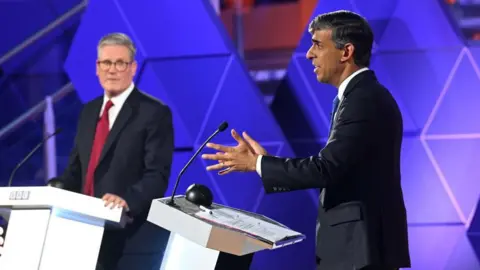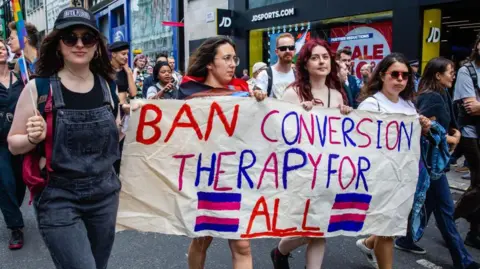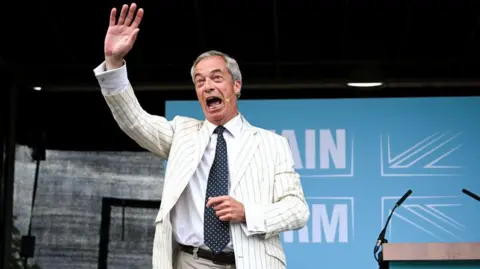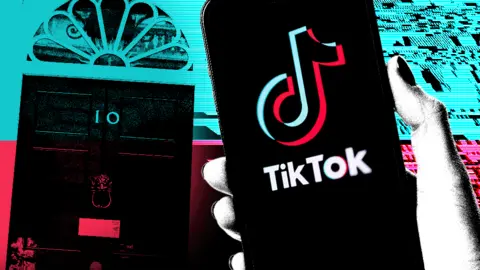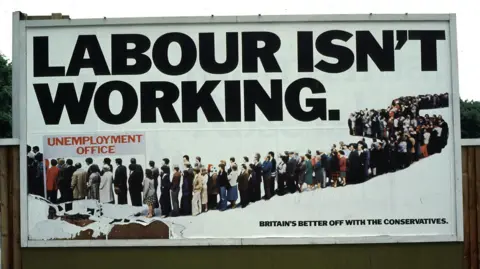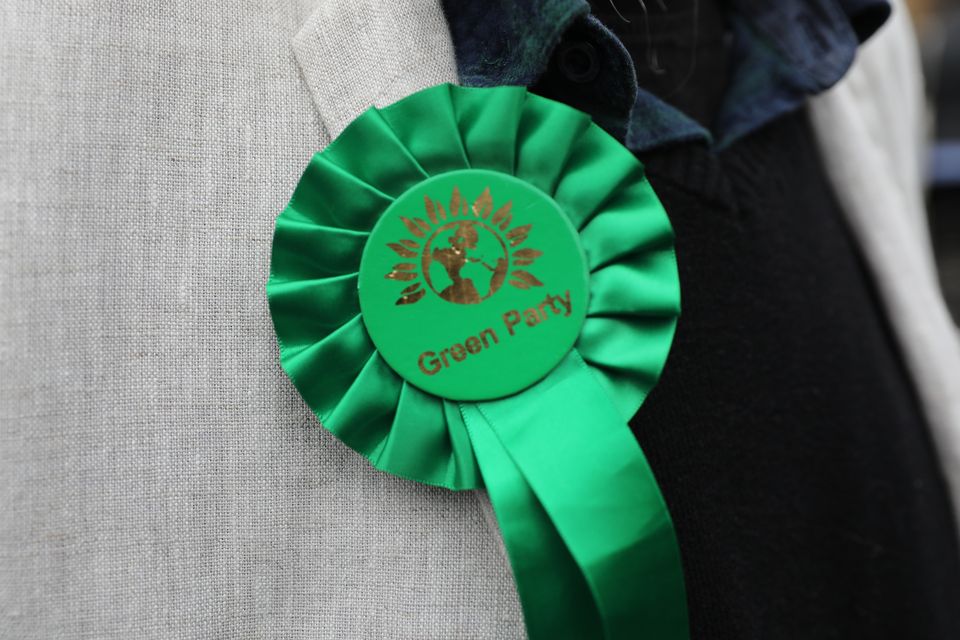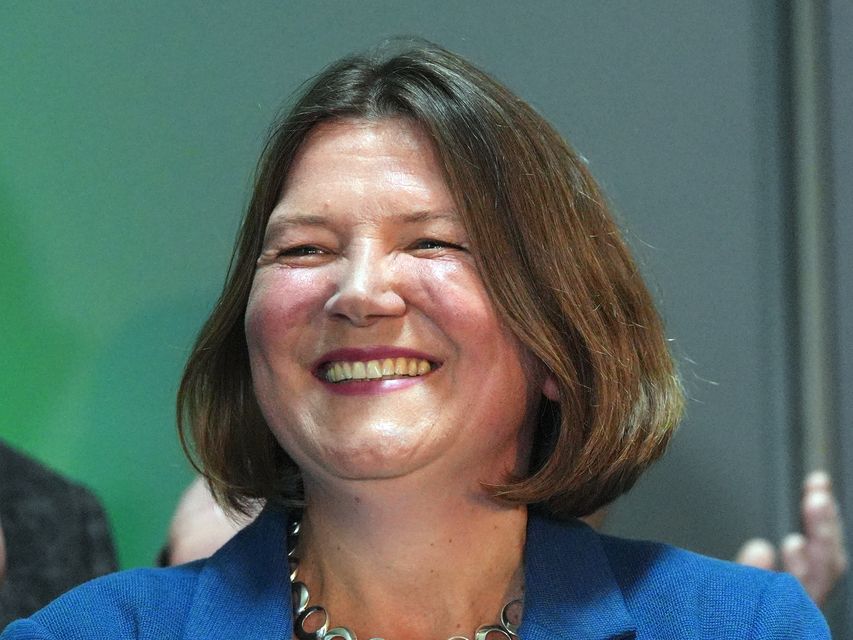'Conspiracy of silence': Why Brexit has been largely absent from UK election campaign
With less than a week to go before the UK's general election, the opposition Labour Party appears on course for a resounding victory. But unlike with the last election in 2019, one word has been almost absent from the campaign trail: Brexit. Why has there been so little discussion of the impact of the country leaving the EU, despite it being one of the main legacies of the outgoing Conservatives' time in office?
Issued on: 29/06/2024 -

On the evening of May 22, a few hours after a rain-soaked Prime Minister Rishi Sunak called a general election for July 4, the pro-European Conservative grandee Michael Heseltine predicted how the campaign would play out. "We're facing the most dishonest election campaign of modern times. Because both major parties have got one obsession, and that is to keep the real debate out of the subject of Brexit," the 91-year-old former deputy prime minister told Sky News. He added: "You can't have a discussion about the country's economy, or its defence, or immigration, or the environment and not discuss Brexit. We have cut ourselves off from our principal market, our most important partners. And that is the underlying crisis that faces this country."
Conservatives 'don’t really have anything to crow about'
For Tim Bale, professor of politics at Queen Mary University of London and author of, "The Conservative Party After Brexit: Turmoil and Transformation", the near-silence on the part of the Conservatives stems from the way Brexit has turned out. "They don't really have anything to crow about in terms of achievements or benefits, particularly with regard to the one that featured so heavily in the Brexit referendum, and that is control of our borders," he said.
"Net migration has increased rather than decreased," he noted, adding: "We've simply had people from outside of Europe fill all the migration that was previously there from people inside Europe."
According to the independent Office for National Statistics, net migration to the UK has more than doubled in the past three years, compared to the same period leading up to the 2016 referendum. The number has risen from 836,000 to 1.9 million, disproving Brexiteers' promises to "take back control" of Britain's borders. When confronted with these figures in a Sky News interview on June 12, Sunak struggled to respond, repeating several times that "the numbers are too high". When it was put to him that he was "the original Brexiteer", the prime minister laughed awkwardly and asked, "Was I?", before acknowledging that he had indeed supported Brexit. Six days later, on June 18, more than 800 migrants crossed the English Channel in a single day, setting a new record high for 2024.
This strategy does not seem to have hurt the party, with Reform now narrowly ahead of the struggling Conservatives in several polls.
Labour worried about scaring off 'Red Wall' voters
Despite polls predicting it will win a huge majority, Labour also finds itself in a difficult position. Like his party as a whole, Starmer opposed Brexit and campaigned to remain in the EU. Yet he has ruled out the UK rejoining the bloc, or even the customs union or single market, if he becomes prime minister.
For Bale, this stance is a result of Labour's fear of scaring off voters in 'Red Wall' seats in central and northern England – people who deserted the party at the last election in 2019 but are expected to back it this time around. Many of them voted for Brexit.
"[Labour] worry that mentioning Brexit will put those people off and maybe see them drift to either the Conservatives again or to Reform," he said.
According to the UK's Office for Budget Responsibility, an independent watchdog, Brexit will inflict a 4-percent hit on the economy's long-term productivity. But as Bale noted, even Labour appears unwilling to address the economic impact of Brexit.
"The consensus among economists is that it's costing Britain dear in terms of growth foregone," he said. "Given that Labour's plans to improve public services and the economy more generally revolve around generating more growth, one would have thought that talking about not necessarily reversing Brexit, but at least rejoining the single market –maybe the customs union – would be an obvious way of generating the growth that they feel needs to be generated."
In a further sign of Labour's reluctance to address the economic consequences of EU exit, Starmer insisted on June 22 that the UK's low economic growth rates "started well before Brexit".
Smaller pro-EU parties, the exception to the rule
The only parties openly discussing Brexit during the campaign are the smaller, pro-European outfits, which are certain to remain in opposition. The centre-left Liberal Democrats are in favour of rejoining the single market. They are hoping to pick up dozens of seats from the Conservatives through tactical voting in the part of southern England known as the "Blue Wall". Bale noted that analysts "thought that they (the Liberal Democrats) would join that conspiracy of silence. But they have actually mentioned rejoining the single market, which is fairly radical." Meanwhile, the Green Party, which is only expected to pick up a handful of seats, backs re-entry to the customs union. Both parties support rejoining the EU in the longer term.
As for the pro-independence Scottish National Party (SNP), it backs Scotland rejoining the EU as an independent country. But with polls showing support for Scottish independence on a knife edge and Starmer having ruled out granting Scotland a second referendum on separation, Scottish EU membership remains a distant prospect for now.
Cracks in the omerta
While unwilling to revisit the result of the 2016 referendum, Labour is nevertheless pledging to pursue closer cooperation with the EU – notably on defence and security – and reduce trade friction. Pressed on this in an interview with LBC radio station on June 18, Starmer declared that "the deal we've got is a botched deal" and vowed to "seek a better agreement" if Labour came to power. The Conservatives seized on these comments, with outgoing Business Secretary Kemi Badenoch claiming that Labour would "take us back to square one" and "copy what the EU does". In a rare attempt to defend the rollout of Brexit, she told The Telegraph: "This is a 10 or 20-year project. We've just started. It's like building a house and someone comes in and says oh, it's not done yet, he's failed. Or you're cooking something and, five minutes later, it's not cooked yet, it's not working, let's stop."
Public opinion turns against Brexit
Rather ironically, the main parties' near-silence on Brexit during the campaign appears out of step with public opinion. According to a YouGov poll from July 2023, 57 percent of people believe the UK was wrong to vote for Brexit and 51 percent would vote to rejoin the EU if a new referendum were held. Looking ahead, Bale predicted that these views cannot be ignored forever.
"For the long term, you have to wonder how long any government will be able to ignore the fact that so many people in this country, and therefore so many voters, think that Brexit was a bad idea and are very open to the idea of rejoining the European Union," he said.
"Here we're talking about Labour's first term. But in the second term, if it hasn't got growth and there's still a very strong feeling in the electorate that Brexit has been a disaster – and there are more and more people in the electorate saying we ought to join the single market and the customs union and even perhaps the EU – then we might see a British government try to do some of those things."
Bale added that the proportion of people in favour of rejoining the EU "is only going to get bigger because so many of those [older people] who voted 'Leave' will be departing the electorate and lots of young people who didn't vote back then or weren't even able to vote, and who have very positive attitudes towards Europe, will be joining the electorate." He predicted "more and more pressure" on any future government, "particularly if we don't get much growth, to reassess the situation".
Labour has indeed billed its manifesto as "a plan to kickstart economic growth". Time will tell if a presumptive Labour government can still do so while fully outside the EU.
